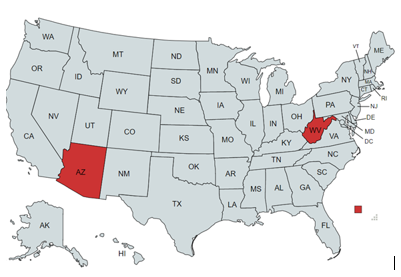 Arizona had only a few days as the only state with broadly available K-12 choice until the West Virginia Supreme Court had the Mountain State join the party.
Arizona had only a few days as the only state with broadly available K-12 choice until the West Virginia Supreme Court had the Mountain State join the party.
Which state might be next?
States like Florida, Indiana, New Hampshire and North Carolina have established momentum. Several states in the west, such as Idaho, Nevada and Utah, have been experiencing strong population growth. Both candidates for governor in Pennsylvania have endorsed expanding choice.
Michigan has something cooking. Wisconsin, the state that pioneered the modern choice movement, has been making steady progress. Determined governors in Iowa and Oklahoma look poised to make a fresh run.
Texas Gov. Greg Abbott leads in the polls and has pledged a serious effort. Other states may lead the line in 2023. Stay tuned.
We are entering an era in which both workers and students constitute scarce commodities. I’ve written before about how West Virginia could offer a profoundly better quality of life to long-suffering families in Northern Virginia, Washington, D.C., and Southern Maryland.
Lower taxes, control over the education of your child, and less expensive property appears to be a potentially powerful combination. Imagine suffering from higher taxes for a long time (forever?), along with a hapless public-school system as a young family in New Mexico. Suddenly, the state next door adopts a low flat tax and universal school choice.
Meanwhile, every time I read the latest story about companies and people fleeing California, Illinois and New York, this Isaac Asimov quote comes to mind:
“The fall of Empire, gentlemen, is a massive thing, however, and not easily fought. It is dictated by a rising bureaucracy, a receding initiative, a freezing of caste, a damning of curiosity – a hundred other factors. It has been going on, as I have said, for centuries, and it is too majestic and massive a movement to stop.”
Winston Churchill noted that “the Empires of the future are the empires of the mind.” Free people with dynamic and pluralistic education systems will have a distinct advantage over states where lawmakers allow special interests to stymie progress.
Look for family choice to become an important consideration in economic development in the years ahead.



Matt: Nice article. Could Milton Friedman’s words come true?
[…] This article originally appeared at reimaginED. […]
I mean Milton got rid of the military draft while he was still alive. This one is going to take a bit longer, but I wouldn’t bet against it.